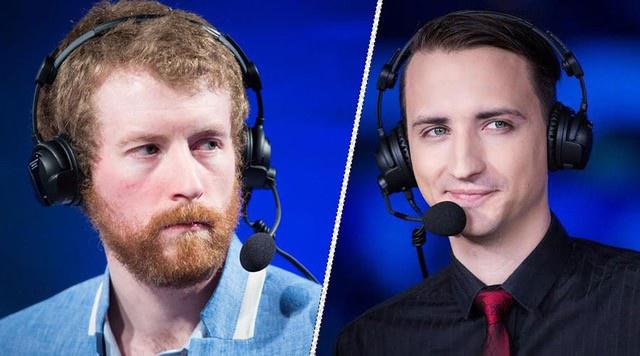Duncan “Thorin” Shields and Christopher “MonteCristo” Mykles are founding talent of the new media venture Last Free Nation
Last Free Nation
Media coverage in the world of esports has always been a tricky proposition. Game developers and publishers own all intellectual property related to their titles, giving them control of the leagues, the tournaments, the broadcasts and often the conversation. At times, it’s difficult to separate truth from marketing spin.
Veteran esports personality Christopher “MonteCristo” Mykles calls the arrangement “monopolistic.” Although he knows the power dynamic is unlikely to change, having worked at different times as a league commissioner, organization owner and broadcast analyst, he’s set on giving the growing numbers of esports fans an alternative voice within the space.
His fledgling company, called Last Free Nation, launched publicly Tuesday with the announcement that several pre-existing shows and talents would now be housed under its brand. The vision is to create an independent and talent-owned network of podcasts and video content from prominent creators, led by Mykles and Duncan “Thorin” Shields, his co-host on the popular League of Legends podcast Summoning Insight.
Within the company, the model is being compared to Bill Simmons’ media network The Ringer, which Spotify bought for nearly $200 million in 2020, and to Reese Witherspoon’s production company Hello Sunshine, which was valued at $900 million in a deal last year.
Those are admittedly lofty comparisons, but Last Free Nation has already taken one small step, signing a “high six figure” sponsorship with Esportsbet.io, a platform allowing users to bet on esports using cryptocurrencies that has appeared in ads on Mykles and Shields’ podcast over the last few months.
Still, the venture is an ambitious one for Mykles and Shields, as well as Last Free Nation’s other contributing content creators. All are trading some portion of their upfront payment for equity in the company, betting that the demand for candid, long-form esports discussion and commentary will continue to rise.
It’s not hard to imagine a future where this freedom to criticize could lead to confrontation with the powers that be. Mykles says he’d love to one day work together with development studios under the shared goal of growing interest in esports, but he isn’t shying away from the idea of Last Free Nation as esports’ own form of pirate radio. One pre-existing Last Free Nation show, The Four Horsemen, focuses specifically on controversy and scandals within the industry.
“The harder they try and crush it, the more legitimate we become in the eyes of the fans,” says Mykles. “So I don’t think it’s a good PR strategy for them, to be overly blunt, because it just creates more legitimate criticism.”
The logo for Last Free Nation.
Last Free Nation
The company’s roster of talent includes Richard Lewis, Christian “IWillDominate” Rivera, Auguste “Semmler” Massonnat, Wolf Schröder, Daniel “Dgon” Gonzales and Alex “MauiSnake” Ellenberg. Together, they command an audience of 3.5 million fans, according to the company.
The job of monetizing that audience falls to newly hired CEO Peter Morris, an experienced media executive who most recently served as CEO of PodcastOne, with past stops at Barstool Sports, IMAX and Funny Or Die. He sees an opportunity in the steady growth of podcasting and esports, both relatively small industries with passionate fan bases.
“We’re filling the blank space at the convergence of those two growth areas,” Morris says. “By pulling talent outside that [developer] bubble and giving them the opportunity to cover esports the way that they want to, with their own creative voice, you’re filling that void for fans.”
Morris says the company will launch on revenue already booked, with plans to sell further sponsorship and advertisements very soon, plus merchandise and ticketed live and virtual events around major national and international esports and gaming events. In the near future, he says, the company will look to raise additional funds from outside investors.
Until then, the roster of talent will need to prove that the brand can generate fans—and hopefully beyond the individual followings of each creator, with Last Free Nation aiming to build a reputation as the go-to industry truth-teller.
“I think it’s a very good challenge for us,” Mykles says. “Our goal is that when you see the Last Free Nation logo, you know the kind of style and tone of the content that you’re going to get.”
